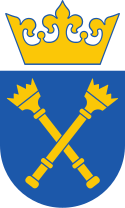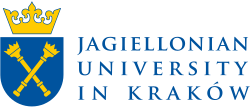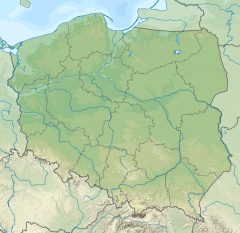
Back Jagielloniese Universiteit Afrikaans Universidat Jaguellonica AN جامعة ياغيلونيا Arabic جامعة ياجيلونيا ARZ Universidá Jaguelónica AST Yagellon Universiteti Azerbaijani یاقیلونیا بیلیمیوردو AZB Ягеллон университеты Bashkir Ягелонскі ўніверсітэт Byelorussian Ягелонскі ўнівэрсытэт BE-X-OLD
Uniwersytet Jagielloński | |
 | |
| Latin: Universitas Iagellonica Cracoviensis | |
Former names | Studium Generale (1364–1397) Collegium Regium (1397–1400) Collegium Maius (1400–c. late 1500s) Kraków Academy (c. late 1500s–1777) Principal School of the Realm (1777–1795) Principal School of Kraków (1795–1817) |
|---|---|
| Motto | Plus ratio quam vis |
Motto in English | Let reason prevail over force |
| Type | Public |
| Established | 1364 |
| Rector | Jacek Popiel |
Academic staff | 3,942 (2021) |
| Students | 35,517 (2021)[1] |
| Undergraduates | 16,222 (2021)[2] |
| Postgraduates | 11,014 (2021) |
| 2,153 (2021) | |
| Location | , Poland 50°3′39″N 19°55′58″E / 50.06083°N 19.93278°E |
| Campus | Urban/college town |
| Affiliations | Coimbra Group EAIE Europaeum EUA Guild of European Research-Intensive Universities IRUN Una Europa Utrecht Network |
| Website | https://en.uj.edu.pl/en |
 | |
The Jagiellonian University (Polish: Uniwersytet Jagielloński, UJ) is a public research university in Kraków, Poland. Founded in 1364 by King Casimir III the Great, it is the oldest university in Poland and the 13th oldest university in continuous operation in the world. It is regarded as Poland's most prestigious academic institution.[3][4] The university has been viewed as a vanguard of Polish culture as well as a significant contributor to the intellectual heritage of Europe.[5]
The campus of the Jagiellonian University is centrally located within the city of Kraków. The university consists of thirteen main faculties, in addition to three faculties composing the Collegium Medicum. It employs roughly 4,000 academics and provides education to more than 35,000 students who study in 166 fields.[5] The main language of instruction is Polish, although around 30 degrees are offered in English and some in German.[6] The university library is among the largest of its kind and houses a number of medieval manuscripts, including the landmark De Revolutionibus by alumnus Nicolaus Copernicus.
In addition to Copernicus, the university's notable alumni include heads of state King John III Sobieski, Pope John Paul II, and Andrzej Duda; Polish prime ministers Beata Szydło and Józef Cyrankiewicz; renowned cultural figures Jan Kochanowski, Stanisław Lem, and Krzysztof Penderecki; and leading intellectuals and researchers such as Hugo Kołłątaj, Bronisław Malinowski, Carl Menger, Leo Sternbach, and Norman Davies. Four Nobel laureates have been affiliated with the university, all in literature: Ivo Andrić and Wisława Szymborska, who studied there, and Czesław Miłosz and Olga Tokarczuk, who taught there.[7] Faculty and graduates of the university have been elected to the Polish Academy of Arts and Sciences, the Royal Society, the British Academy, the American Academy of Arts and Sciences, and other honorary societies.
- ^ "Jagiellonian University Facts and Figures 2021". en.uj.edu.pl. Jagiellonian University. 2021. Retrieved 14 April 2021.
- ^ "Dane statystyczne Uczelni as of December 31 2020". en.uj.edu.pl. Jagiellonian University. 2021. Retrieved 14 April 2021.
- ^ "Study in Poland". Top Universities. 3 September 2014. Retrieved 4 January 2017.
- ^ "Jagiellonian University". Times Higher Education (THE). Retrieved 4 January 2017.
- ^ a b "Overview – Jagiellonian University". en.uj.edu.pl. Retrieved 15 February 2022.
- ^ "Welcome to the Jagiellonian University – Programmes". www.en.uj.edu.pl. Retrieved 14 April 2021.
- ^ "Study of Literature and Art at the Jagiellonian University in Kraków : Kraków Miasto Literatury UNESCO". krakowcityofliterature.com. Retrieved 23 February 2022.
© MMXXIII Rich X Search. We shall prevail. All rights reserved. Rich X Search
